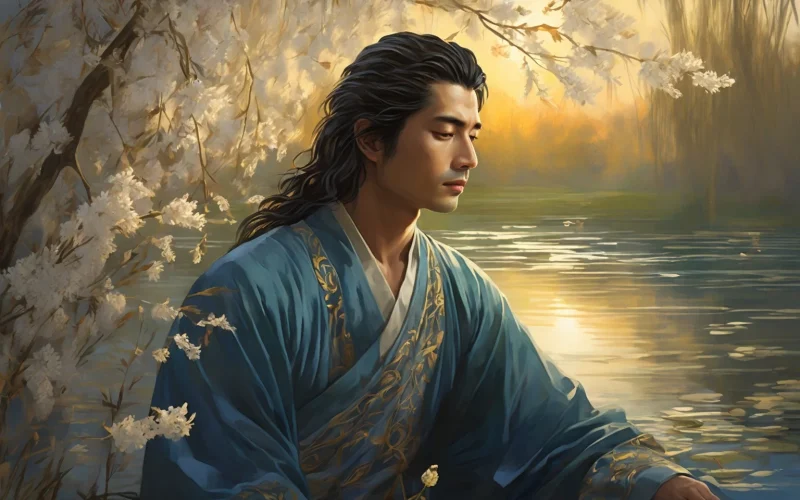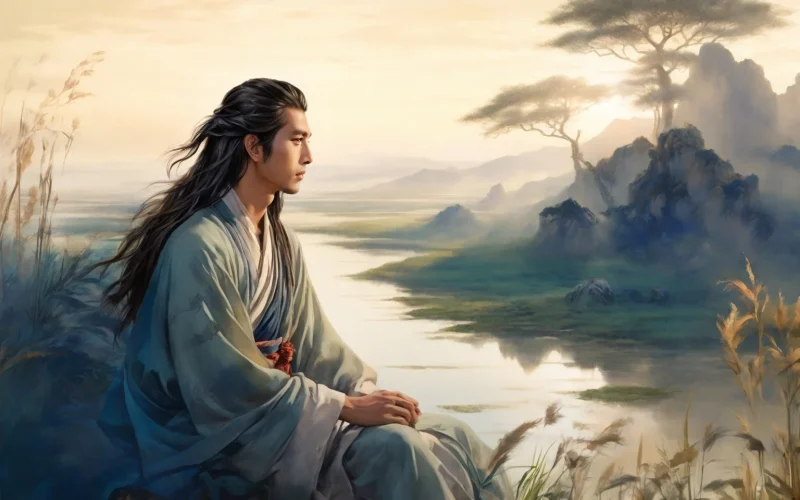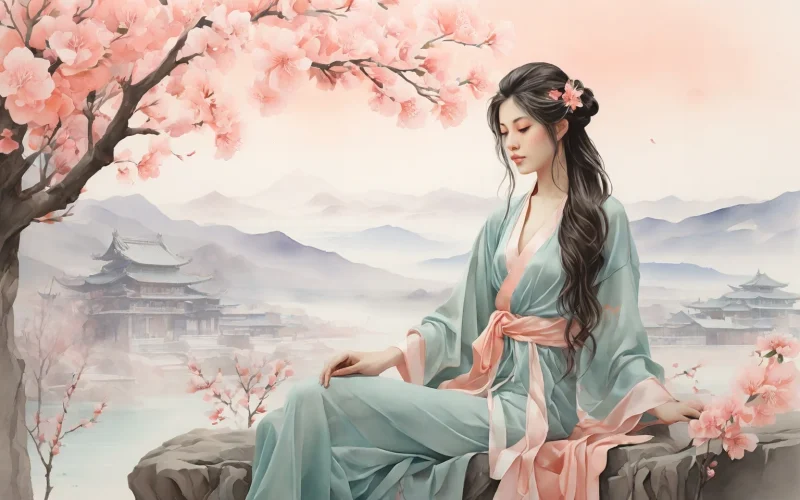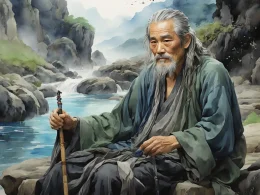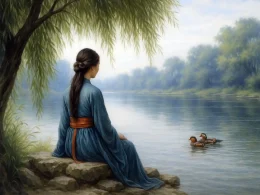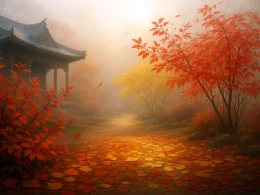Windless pond mirrors sunset’s glow,
Willow fluff drifts where sunbeams flow.
To kiss the clear surface they dare—
Trapped in endless wet, stranded there.
Original Poem
「池上絮」
韩愈
池上无风有落晖,杨花晴后自飞飞。
为将纤质凌清镜,湿却无穷不得归。
Interpretation
Composed during Han Yu's exile to Chaozhou (circa 819 CE) following his famous protest against Buddha's Bone Relic worship, this poem transforms a quiet waterside observation into an existential allegory. The willow catkins' doomed dance—hovering between air and water—becomes a mirror for the poet-official's own suspended state between principle and compromise, freedom and dissolution.
First Couplet: "池上无风有落晖,杨花晴后自飞飞。"
Chí shàng wú fēng yǒu luò huī, yáng huā qíng hòu zì fēi fēi.
Windless pond holds sunset's glow— / Willow down takes flight post-storm.
The scene establishes elemental paradox: stillness ("windless") coexists with motion ("takes flight"), while sunlight after rain suggests ephemeral reprieve. The catkins' autonomous dance ("自飞飞") hints at nature's indifference to human plight—a subtle challenge to Han Yu's Confucian worldview.
Second Couplet: "为将纤质凌清镜,湿却无穷不得归。"
Wèi jiāng xiān zhì líng qīng jìng, shī què wúqióng bùdé guī.
To skim their delicate forms o'er water's mirror— / They drown, becoming endless captives.
Here, the pond's reflective surface ("water's mirror") tempts the catkins toward fatal vanity. The devastating verb "drown" (湿却) literalizes metaphysical sinking, while "endless captives" (无穷不得归) echoes Han Yu's own political entrapment. The couplet serves as his self-caution: intellectual pride (mirror-gazing) risks spiritual demise.
Holistic Appreciation
The poem transitions seamlessly from movement to stillness, then from scenery to contemplation, deepening its reflections step by step. The poet begins with delicate brushstrokes depicting the springtime scene of willow catkins dancing over a pond, then shifts focus to their descent into the water—a subtle yet pivotal moment that sparks profound meditation. While ostensibly portraying an ordinary spring day by the pond, the poem subtly embodies reflections on life’s transience: are we not all like those willow flosses, lifted by the wind yet weighed down by our own attachments? Beneath its surface lies not only a lament for spring’s passing but also philosophical musings on the interplay between "destiny" and "self-perception." It reveals the poet’s keen sensitivity to nature and life, as well as his ability to distill deep meaning from the mundane.
Artistic Merits
The poem’s artistry lies in its seamless fusion of meticulous detail and metaphorical depth. Without overt emotional expression, it brims with quiet sentiment. The precision of its imagery—such as "drifting freely" and "drenched, then sinking"—showcases Han Yu’s gift for drawing profound insights from small, observed moments. Its brilliance in analogy extends the fate of a single willow floss into a universal reflection on human existence, weaving Zhuangzi’s philosophical musings into lived experience. The language is simple yet resonant, embodying a rare tenderness and meditative beauty in Han Yu’s poetic style.
Insights
"Willow Catkins Over the Pond" is more than a lyrical ode to nature—it is a philosophical meditation on life. It teaches us that in a world of distractions, the pursuit of self-validation may lead us away from our true essence. Like the willow floss, naturally weightless and free, it is the attempt to "conquer the mirror’s surface" that drags it down. Han Yu cautions against the traps of vanity and the perils of attachment, urging us not to lose ourselves in the chase for hollow recognition. Even in exile, his ambitions unfulfilled, he finds solace in observing spring’s fleeting beauty by the pond, extracting life’s truths from the smallest details—a model of "enlightenment through observation."
About the Poet
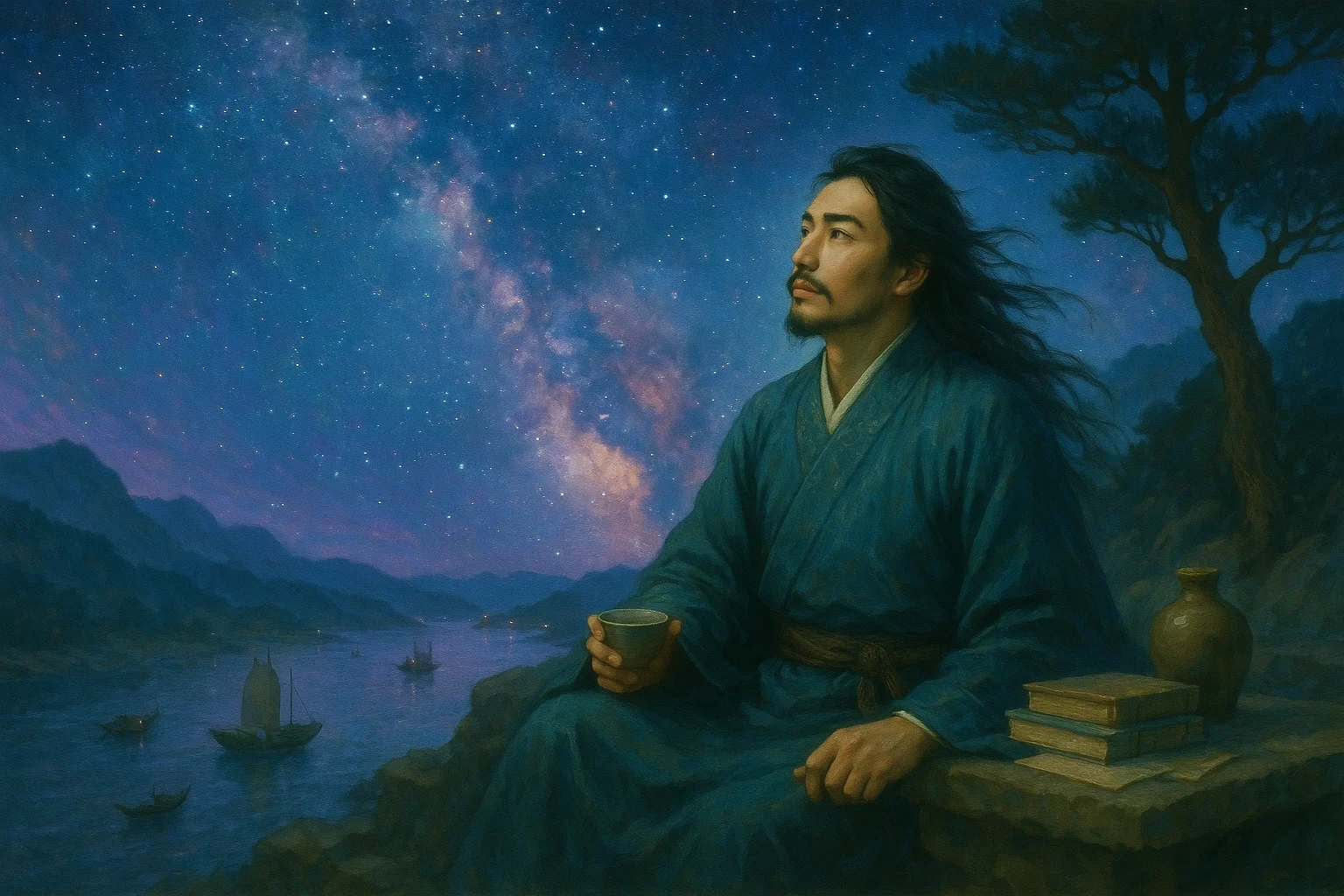
Han Yu (韩愈, 768 - 824), originario de Mengzhou en Henan, fue el líder del Movimiento de la Prosa Antigua durante la dinastía Tang. Obtuvo el título de jinshi en 792 y ascendió al cargo de Viceministro de Personal. Su prosa es vigorosa y poderosa, mientras que su poesía se caracteriza por un estilo audaz y poco convencional. Su poema Rocas de la Montaña (山石) inauguró la técnica de "prosificar la poesía". Fue mentor de poetas como Meng Jiao y Jia Dao, y es considerado el principal de los "Ocho Grandes Maestros de la Prosa de Tang y Song". Sus contribuciones revolucionarias a la literatura tuvieron una influencia profunda y duradera, lo que le valió el título honorífico de "Maestro Literario de las Generaciones".






